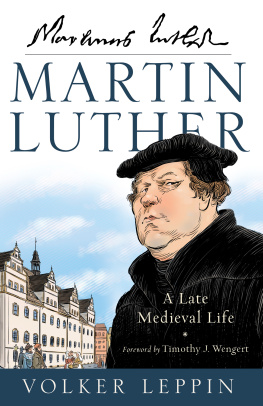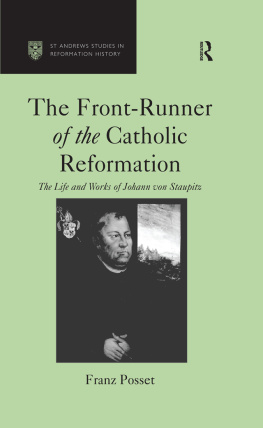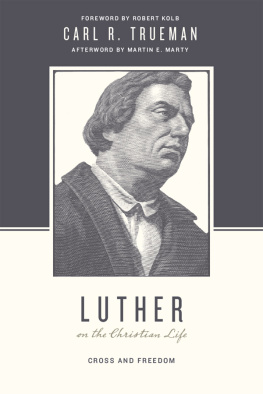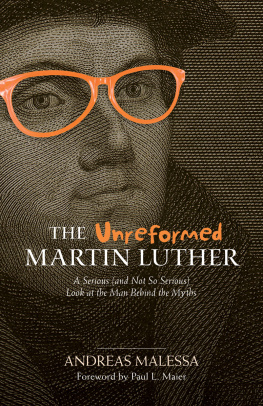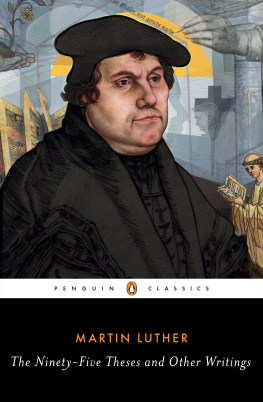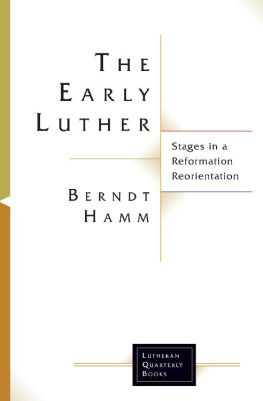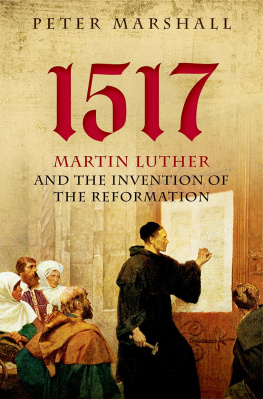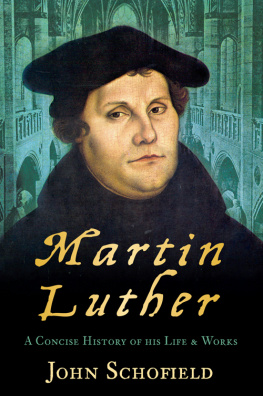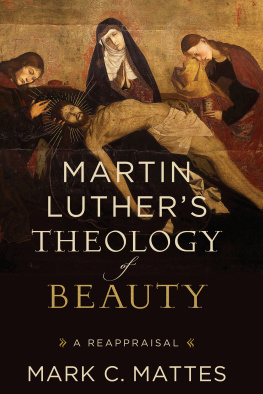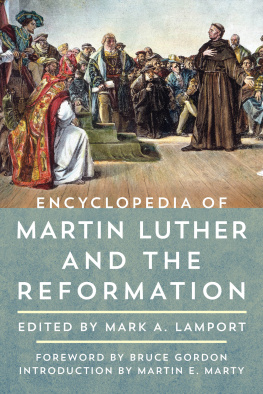Timothy J. Wengert
1. The Son: Destined for Higher Things
2. The Monk
3. The Young Professor
4. The Publicist
5. The Prophet
6. The Preacher-Bishop from Wittenberg
7. The Year of Climax, 1525
8. The Educator
9. The Outsider: On the Margins of the Reformation
10. The Old Professor
11. The End of Life
Foreword
A nniversaries with round numbers often elicit biographies and other scholarly studies. Thus, 2017 becomes an excellent time for readers to reacquaint themselves with the life and thought of Martin Luther (14831546), whose 95 Theses were first distributed and printed five hundred years ago. Some of the works produced for the five hundredth anniversary will doubtless simply rework the familiar contours of Luthers life and the origins of the German Reformation. Others may inadvertently import our own cultures favorite tropes into the distant pasteither to praise or to excoriate the Augustinian friar from Wittenberg. By contrast, readers of this new biography by Volker Leppin will receive a compact summary of Luthers biography based on the very latest and best scholarship. In addition, this book avoids the temptation to modernize Luther and instead carefully leads readers into the world of sixteenth-century central Europe so that Luther may be appreciated in the light of his own time, not ours.
The author, Volker Leppin, is unfortunately not yet well known to the English-speaking world, but his training and scholarship recommend him highly. He began his academic life at the University of Heidelberg, where, under the tutelage of Gottfried Seebass, After a brief stint in Frankfurt, he became professor of church history at the University of Jena (20002010) before being called as professor of church history in the Protestant faculty of theology at the University of Tbingen, where, as the successor to Ulrich Kpf and Heiko Oberman, he also directs the Institute for the Late Middle Ages and Reformation. His vast publications and his work with other scholars in Germany, especially focused on the Middle Ages and the Reformation, have made him one of the most important church historians in Germany today and one of the best among a new generation of German academicians.
A sampling of his considerable literary production over the years provides a good sketch of his wide-ranging interests in church history. He has a deep commitment to providing primary literature to German readers. Thus, in 2000 he produced with Sigrid Mller a German translation of excerpts from William of Ockham; in 2001, with Adolf Martin Ritter and Bernhard Lohse, he produced a broader set of medieval sources; and in 2005 he wrote a similar volume on the Reformation. Out of research for that book the present, smaller work emerged.
The care with which he has conducted research over the years and the insights that he brings to the study of the Reformation and its origins aptly reflect the work of the late Gottfried Seebass (a scholar known for his work on the Lutheran reformer Andreas Osiander and on the Anabaptist movement in the sixteenth century). This biography also echoes the work of Heiko Oberman, who is most famous in the English-speaking world for his study of Gabriel Biel ( The Harvest of Medieval Theology ) and his provocative biography of Luther ( Luther: Man between God and the Devil ). In these pages as well, the reader will discover a Martin Luther firmly grounded in late medieval life and thought, with special emphasis given to Luthers debt to the German mysticism of Johannes Tauler and of the head of Luthers own Augustinian order in Germany, Johann von Staupitz. By placing Luther squarely within his late medieval milieu, Leppin allows the reader to uncover both continuity with the intellectual movements of the late Middle Ages and unique aspects of Luthers theology.
For one example of the skill with which he tells Luthers life story, consider how Leppin expresses a particularly trenchant aspect of Luthers theological development by employing the spellings of the reformers name that Luther himself used. Well into his thirties, Martin Luther was actually Martin Luder, as his family spelled and doubtless pronounced it. But then in 1517, Luther consciously Hellenized his name based upon the Greek eleutherios , the free one. Besides conforming to the practice of many humanists of the day (including Philipp Melanchthon, whose Greek surname translates Schwartzerdt, black earth; and Johannes Oecolampadius, Greek for Huszgen, later Hausschein, house light), Luther expressly chose this spelling to reflect the center of his own theology, as he came increasingly to emphasize the freedom of a Christian justified before God simply by grace through faith on account of Christ.
Leppins chief contribution to our understanding of Luther stems from his careful distinguishing of Luthers later accounts of early events in his life from earlier accounts, especially given the influence of the later accounts in relating Luthers life story. Leppin meticulously separates Luthers decision to turn from the study of law and instead to enter the monastery from the famous story of his distress in a thunderstorm and his cries to St. Anne. Leppin places the decision instead within the growing tensions between a successful father and a strong-willed son. Leppin also rightly dismisses Luthers later criticisms of his own life as an Augustinian friar and instead shows just how obedient and successful Luther was as he moved from novice and student of theology to professor at the University of Wittenberg and provincial vicar within his order. Leppin also uses the new dating of Luthers journey to Rome to underscore Luthers commitment to the reform undertaken by Staupitz. But underneath these and similar gentle corrections, Leppin introduces a crucial correction to most views of Luther: he was continuously wracked by spiritual struggles, searching in vain for a gracious God. Leppin thus demythologizes the standard view of Lutherinvariably the stuff of movies and other fictionalized accounts of Luthers lifeand places him squarely in his own time.
The reader will also encounter the young Luther as a highly educated, careful scholar, whose interest in biblical theology (already before he began his lectures on the Psalter in 1513 as a newly minted doctor of theology) and in the most recent biblical scholarship marked the cutting edge of his theological investigations. When Leppin turns to the highly debated question of Luthers so-called theological breakthrough, he rejects both an early and a late dating by challenging the whole notion of a breakthrough as conceived by twentieth-century scholars who were dependent upon Luthers own later retelling of his early career. Grounding his approach to Scripture on the pro me , a way of reading that highlighted the existential and personal, Luther had much in common with earlier writers such as Johannes Tauler or Bernard of Clairvaux and, above all, with his mentor and father confessor, Staupitz. But Luther was among the first to bring such concerns into the classroom of the medieval university.

